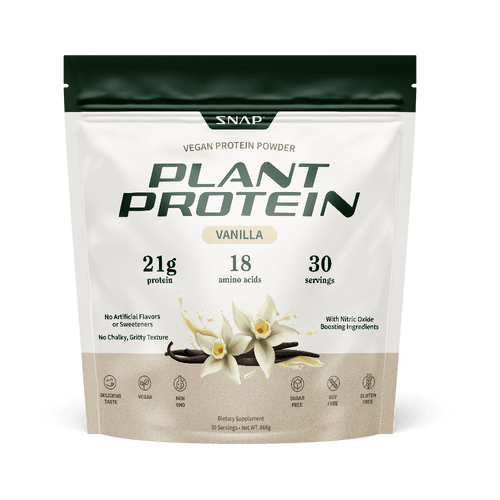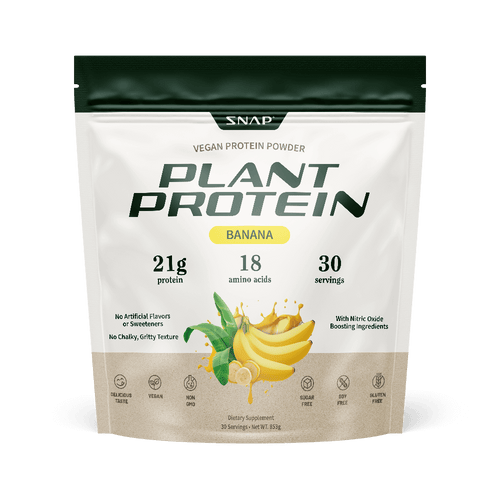All About Plant Based Protein
Of the three macronutrients, protein is arguably the most beloved. Despite the endless controversy that pervades the world of nutrition, most people agree that when it comes to reaching your health and wellness goals, consuming enough protein is essential.
Protein offers a wellspring of benefits including building muscle, repairing wounds, supporting immunity, balancing blood sugar, and satisfying hunger — what’s not to love?
The real protein controversy boils down to which foods you get it from.
There are countless whole food and supplement sources of protein available on the market, but plant based protein has been experiencing a surge in popularity over the last few years.
Here we’ll explore some of the pros and cons of plant based protein including how it stacks up to whey protein.

Vanilla Plant Protein
$57.00
What Makes a Protein “Complete”?
Proteins are made up of building blocks called amino acids. There are 20 total amino acids the human body uses to stay healthy, but 9 of them must come from your diet because your body cannot manufacture them on its own(1). These 9 amino acids are known as essential amino acids, or EAAs(1).
A protein is dubbed complete if it contains all 9 EAAs in the proper ratios needed to optimize human health(1).
Not too long ago meat, eggs, and dairy products were largely considered the only viable sources of protein because animal based proteins are always complete. This led to the placement of animal proteins on somewhat of a nutrition pedestal.
But modern research flipped that pedestal upside down.
Although there are a few exceptions, protein derived from plant sources are not usually considered complete because they’re lacking in 1 or 2 of the EAAs. These are known as limiting amino acids(1).
But it’s important to note that plants offer a lot more than just protein. In fact, plants tend to contain a wider variety of antioxidants, vitamins, minerals, and fiber than most animal based foods(2). Not to mention, research indicates that people who consume more plants tend to have more favorable mental and physical health outcomes across their lifespan(3).
So regardless of whether you choose to include animal protein in your diet, almost everyone can benefit from eating more plants.
Making a Plant Based Protein Complete
You may be wondering, “well if plants are so great, does the incomplete status of plant proteins still matter?” Absolutely — but it’s an easy fix.
You can create complete proteins using only plant based foods by pairing different types together(4).
For instance, one of the most popular plant based protein pairings is beans and rice.
Beans are among the richest sources of plant protein you can find, but they are naturally lacking in two essential amino acids: tryptophan and methionine. Rice contains both tryptophan and methionine, but it’s low in the essential amino acid lysine.
But when you pair lysine-rich beans with tryptophan- and methionine-rich rice, you have just created a nutrient dense source of complete protein.
The best part is you don’t necessarily have to eat the beans and rice at the same meal, you simply want to make sure you consume them within the same day(5).
The best way to ensure you’re getting an adequate supply of EAAs from your diet is to consume a wide variety of plant based protein sources across each meal and snack(4).
Beans, peas, whole grains, nuts, and seeds are all excellent options for those seeking to boost their intake of plant based protein.

Chocolate Plant Protein
$57.00
Plant Based Protein vs Whey Protein Powders: How Do They Compare?
When it comes to protein powders, whey protein and plant based protein are among the most popular.
Whey protein is derived from milk — usually cow or goat. It’s an affordable source of complete protein and it can be easily assimilated into muscle tissue, or anywhere else your body needs it.
Plant based protein powders can be made from a variety of foods including soy, hemp, peas/beans, and rice. SNAP’s new complete plant based protein powder is made from a combination of pea- and rice-derived protein.
Whey: New Intel on an Old Standby
Though whey is a go-to protein supplement for most people, it’s not because of diligent research, but familiarity.
Like many dietary fads gone too far, researchers are starting to question the logic behind it. A recent meta-analysis on whey protein intake laid out a bevy of adverse effects(1).
Increased anger and acne were commonly noted when consuming whey protein daily. Though one may be less concerning than the other, both indicate that the typical bovine source is a major hormone disruptor(1).
Whey was also found to negatively impact kidney function. Increased urea, urinary volume, and calcium excretion all point to kidneys working overtime to process whey(1).
Those ingesting whey protein as meal replacement shakes and bars without exercising fared the worst. Without the need for muscle repair, whey protein gets sent to the liver and ensues damage in the process(1).
Lastly, whey protein isn’t beneficial to the gut. Exercise can improve digestion, but ingesting heavy whey supplements is counteractive(1).
A 2018 study of athletes supplementing with whey found imbalances of harmful gut bacteria likely related to the difficulty many have digesting dairy(1).
Vegetable Proteins Gaining Support
For a while, trends like veganism and paleo drew strong divides in the fitness community. Now, truly health conscious consumers are more aware that the quality of products and their sources are what matter most.
Plant-based proteins are gaining allure for a variety of reasons, with a major factor being they’re far less processed than whey protein. Absorptive and gut friendly proteins retain their beneficial fiber and nutrients, aiding longevity for any fitness goal(2).
Heart disease is still the number one killer today and should be a consideration refueling, not just working out. Plant proteins offer benefits to blood pressure and cholesterol levels not possible with animal proteins(3).
The latest research favors pea proteins, as they have all of the essential amino acids required to build proteins. For a low-calorie, heart healthy option, we like the research data(4).
In an 8-week trial, study groups consumed equal amounts of pea and whey protein while undergoing a rigorous exercise regime. All participants increased muscle development and strength performance, with no significant difference detected between the groups(4).

Banana Plant Protein
$57.00
Bottom Line
If you're looking to improve your health and fitness with a protein supplement, choose one that is made from ingredients you’d also put on your plate.
Many people take protein supplements to lose weight as often as they do to gain muscle, so stay aware of protein mixes laden with extra calories, indigestible ingredients, and a lack of quality nutrients.
If you’re considering a protein supplement that will benefit your fitness goals and long term health plans, consider three reasons plant-based proteins make an optimal choice:
Fits Seamlessly Into All Diets
Plant based diets are becoming increasingly popular and for good reason: there’s no denying the benefits of including more plants in your diet. Improving digestive health and getting more nutrients is obviously a benefit.
It’s Allergy-Friendly
Dairy is one of the most common food allergens in the world. Food sensitivities, intolerances, and digestive problems are on the rise and dairy products are often the culprit behind uncomfortable symptoms like gas and bloating. Plant-based protein powders made from peas and rice contain complete amino acid profiles and require a lot less processing.
It’s More Environmentally Sustainable
As the global population grows and our vital natural resources dwindle, it’s increasingly important that we become more mindful with the foods we choose to consume. Pea farms require fewer natural resources than dairy farms and they can be used to restore nutrient-depleted soil(7).
If including a high-quality protein in your diet is one of your goals, check out our brand new line of plant-based protein powders today.